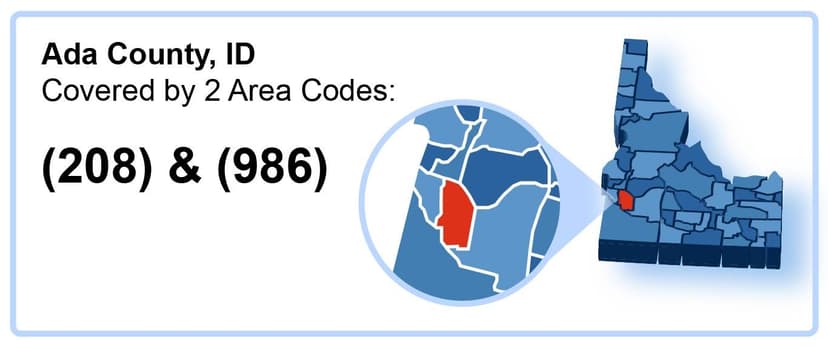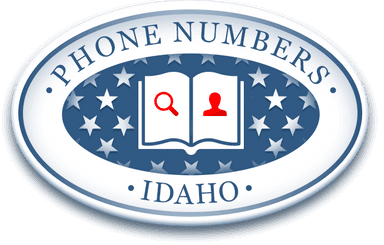What are Ada County Area Codes?

Ada County area codes are the three-digit numeric codes that identify the numbering plan areas (NPAs) that cover Ada County. The North American Numbering Plan (NANP) introduced NPAs to differentiate the various telephone service territories under its purview. The need to streamline the different telephone numbering schemes in existence and ease long-distance calling led to the introduction of the NANP. In Ada County, the Idaho Public Utilities Commission (IPUC) administers all the area codes.
Two telephone area codes cover the entire State of Idaho. These are:
Area Code 208
Area code 208 was one of the 86 original area codes implemented in 1947. Locations in Ada County served by this NPA include Boise, Eagle, Garden City, Hidden Springs, Kuna, Meridian, and Star.
Area Code 986
Area code 986 is a NANP telephone overlay code for the 208 NPA and was implemented in 2016. It covers the same location as area code 208.
What are the Best Cell Phone Plans in Ada County?
Idaho residents overwhelmingly favor wireless phone services over landlines as their preferred choice of telecommunications. A 2018 National Health Interview Survey provides evidence to support this conclusion The survey reported that 72.2% of adults in Idahoan households used wireless-only telephony services while 3.1% relied solely on landlines for telephony services. The difference is starker among minors (under 18) in Idaho, with 81.8% residing in households that exclusively used wireless telephony services. Less than 1% of children in Idahoan homes used landlines only for their telephony services.
All four major phone carriers are represented in Idaho, as are several Mobile Virtual Network Operators (MVNOs) that run on their networks. Verizon offers the most robust coverage, followed closely by AT&T, and then T-Mobile. Sprint lags far behind the other networks but its customers can connect to other networks where Sprint has roaming agreements. The MVNOs all offer decent services, using the major carriers’ network infrastructure, especially in the cities and urban centers.
Voice over Internet Protocol (VoIP) facilitates telephony service delivery across IP networks, instead of copper wires and electromagnetic waves. The ability to deliver telephony services across broadband internet connections affords VoIP several advantages such as flexibility, efficiency, and value-added services. These advantages ensure that VoIP is cheaper than traditional telephone services and has made it a popular and practical telecommunications alternative, especially for businesses. Several providers offer VoIP services to Ada County residents.
What are Ada County Phone Scams?
Ada County phone scams are fraudulent acts perpetrated by those using telephone services to steal money and personal information from the county’s residents. Fraudsters commit these acts using live calls, automated calls, and text messages. A reverse phone number search can retrieve information on the phone numbers used to commit scams.
The Idaho State Attorney General enforces laws to protect residents from unfair and deceptive practices. They can file complaints online or contact the A.G’s Office on (208) 334-2424 or 1 (800) 432-3545. Ada County residents can also file complaints about phone scams with the Ada County Sheriff’s Office, their local police departments, and the FTC. Common Ada County phone scams include:
What are Professional License Scams?
According to the Idaho State Attorney General Office, scammers target licensed professionals in phone scams. They impersonate licensing board officials and inform their targets that their licenses were suspended indefinitely pending investigations into their activities. However, the targets can keep their licenses active if they pay surety bonds that they can reclaim when the investigations are over. They fax the victims forms for completing payments. These callers may spoof caller IDs to display old Idaho government phone numbers and they usually have the addresses and licensing information of their targets.
Authorities warn residents to be suspicious of these calls. Professional licensing boards will not request payment over official investigations. Unknown callers asking for payments are almost always scammers. If you receive this phone call, hang up, contact your licensing board directly, and make inquiries. Residents can file complaints about these scams with the Attorney-General’s Office or contact local law enforcement.
What are Law Enforcement Impersonation Scams?
Scammers contact Ada County residents posing as law enforcement officers, usually Sheriff’s deputies and police officers. The callers inform their targets of outstanding warrants against them, which they must pay off. The outstanding warrants are typically for missed court appearances, active investigations, and unpaid tickets. The scammers threaten their targets with arrest if they refuse to pay. If the victims agree to pay to settle these bogus warrants, they are asked to send payments by wire transfers and prepaid debit cards. Scammers may also ask for financial information or set up meetings to collect cash.
The Ada County Sheriff’s Office (ACSO) and other law enforcement agencies in the county will never ask residents for payments to clear warrants. They will also never insist on such methods as wire transfers and prepaid cards for payments. Scammers favor these methods because of the difficulty in tracing funds sent through them. Residents who receive these types of calls should hang up immediately. Report such a call to the ACSO or your local police department. A reverse phone number lookup service can throw some light on suspicious phone calls.
What are Robocalls and Spam Calls?
Robocalls are automated phone calls pre-programmed to deliver messages when answered. Robocalls are telemarketing tools used to contact large numbers of people with minimal effort. Their wide reach makes them useful for sales companies running telemarketing campaigns, political organizations, and organizations making public service announcements. Scammers have adopted robocalls as tools to steal money and sensitive information from residents because of this ability. It enables them to contact numerous potential targets with little effort. They can do this while impersonating reputable entities to increase their chances of success.
Reverse phone number lookup applications can identify incoming robocalls and so you can screen them. Best practices for dealing with illegal robocalls include:
- Adding your phone number to the National Do Not Call Registry. This is a list of phone numbers restricted from receiving most forms of telephone solicitations. Legitimate marketers will not call you after joining the DNC Registry. Therefore, you may treat telephone solicitations received afterwards as potential scam calls.
- Report illegal robocalls, and spam calls to the FTC at 1 (888) 382-1222 or with the online complaint assistant. The FTC also provides tips on how to block unwanted calls on its website.
- Use call-blocking and call-filtering features and apps provided by phone service providers and phone manufacturers. You can also find online reverse phone lookup free services that can identify incoming robocalls.
- End a robocall as soon as you realize you are on one. Robocalls aim to keep receivers on the line and use message prompts to hold their attention.
How to Spot and Report Ada County Phone Scams?
No one can completely avoid being a target of phone scammers. Scammers also vary their schemes and come up with new ways of finding their victims. Education and awareness are the best ways to spot scams before they cause any damage. Knowledge about how phone scams are pulled off can help residents detect and avoid them. Numerous online services that perform phone number lookups can ascertain “who is this number registered to?” and “who called? when contacted by unknown callers. These services are available for free, though premium versions come with subscription fees. The information returned by these services can be used when reporting phone scams.
The following are indicators that unknown callers are trying to run scams:
- Calls from supposed law enforcement officers who aggressively demand payment and confident information and threaten arrest to get you to comply. Real law enforcement officers will not use threats against residents on phone calls.
- Calls about investment opportunities that promise quick high returns but require immediate funding. The caller tries to dissuade you from taking the time to consider the proposal and pushes for a quick commitment. Be very suspicious of callers with business proposals that do not allow you time to research their offers.
- Calls informing you of large winnings in lotteries and prize competitions. However, to receive your winnings, you must make upfront payments to cover taxes and processing fees. Any prize that requires an upfront payment to collect is likely a scam.
- Calls from reputable organizations, such as government agencies, requesting personal information such as social security numbers and financial details such as credit card numbers. Reputable organizations will never ask for the confidential information on unsolicited phone calls.
- Calls from reputable entities who insist on payments via wire transfers, prepaid debit cards, and retail gift cards. Only fraudsters insist on payments via these channels. Not only are they insecure, but funds sent through them are virtually untraceable once sent.
If you have been a victim of a phone scam in Ada County, you can contact any of these agencies for assistance:
Idaho State Attorney General - The Consumer Protection Division of the Attorney General’s Office enforces consumer laws against unfair and deceptive market practices. Victims of phone scams can file complaints online or contact the A.G’s Office on (208) 334-2424 or 1 (800) 432-3545.
Local Law Enforcement Agencies - Local law enforcement agencies like Ada County Sheriff’s Officer and local police departments receive reports from phone scams victims. Residents can contact the ACSO online or call (208) 577-3000 or call their local police departments.
Federal Trade Commission (FTC) - This is the regulatory authority in the marketplace that protects consumers from deceptive and unfair practices. The National Do Not Call Registry is one of the FTC’s consumer policies developed to curb unwanted robocalls and spam calls. It also provides tips on blocking unwanted calls. Victims should file complaints about illegal robocalls and other phone scams with the online complaint assistant or call 1 (888) 382-1222.
Better Business Bureau (BBB) - The BBB promotes marketplace trust and is one of the go-to resources for verifying the trustworthiness of business entities and charitable organizations. Residents can obtain valuable information about businesses, brands, and charities from the BBB. It also provides signup alerts about prevalent scams in the county.
